|
|
|
Sort Order |
|
|
|
Items / Page
|
|
|
|
|
|
|
| Srl | Item |
| 1 |
ID:
025042
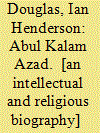

|
|
|
|
|
| Publication |
DelhI, Oxford University Press, 1988.
|
| Description |
xii, 358p.Hbk
|
| Standard Number |
195622057
|
|
|
|
|
|
|
|
|
|
|
|
Copies: C:1/I:0,R:0,Q:0
Circulation
| Accession# | Call# | Current Location | Status | Policy | Location |
| 029477 | 923.254/DOU 029477 | Main | On Shelf | General | |
|
|
|
|
| 2 |
ID:
101519
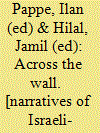

|
|
|
|
|
| Publication |
London, I B Tauris, 2010.
|
| Description |
vi, 462p.
|
| Standard Number |
9781848853454, hbk
|
|
|
|
|
|
|
|
|
|
|
|
Copies: C:1/I:0,R:0,Q:0
Circulation
| Accession# | Call# | Current Location | Status | Policy | Location |
| 055581 | 956.9405/PAP 055581 | Main | On Shelf | General | |
|
|
|
|
| 3 |
ID:
031055
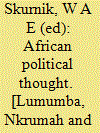

|
|
|
|
|
| Publication |
Dencer, University of Denver, 1968.
|
| Description |
147p
|
| Series |
Monograph series in world affairs; No.3 & 4
|
|
|
|
|
|
|
|
|
|
|
|
Copies: C:1/I:0,R:0,Q:0
Circulation
| Accession# | Call# | Current Location | Status | Policy | Location |
| 002592 | 320.0960/SKU 002592 | Main | On Shelf | General | |
|
|
|
|
| 4 |
ID:
141499


|
|
|
|
|
| Edition |
1st ed.
|
| Publication |
London, Pluto Press, 2012.
|
| Description |
xxvi, 236p.pbk
|
| Standard Number |
9780745332628
|
|
|
|
|
|
|
|
|
|
|
|
Copies: C:1/I:0,R:0,Q:0
Circulation
| Accession# | Call# | Current Location | Status | Policy | Location |
| 058328 | 303.625/FIN 058328 | Main | On Shelf | General | |
|
|
|
|
| 5 |
ID:
128298
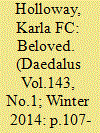

|
|
|
|
|
| Publication |
2014.
|
| Summary/Abstract |
When the music entered the window . . . both women heard it at the same time. . . . [W]here the yard met the road, they saw the rapt faces of thirty neighborhood women. Some had their eyes closed; others looked at the hot. cloudless sky. Sethe opened the door and reached for Beloved's hand. Together they stood in the doorway. For Sethe it was as though the Clearing had come to her with all its heat and simmering leaves, where the voices of women searched for the right combination, the key, the code, the sound that broke the back of words. Building voice upon voice until they found it, and when they did it was a wave of sound wide enough to sound deep water and knock the pods off chestnut trees. It broke over Sethe and she trembled like the baptized in its wash.
|
|
|
|
|
|
|
|
|
|
|
|
|
|
|
|
| 6 |
ID:
176075
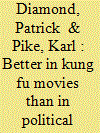

|
|
|
|
|
| Summary/Abstract |
Eric Hobsbawm will forever be a giant intellectual figure. Yet, an aspect of his work is underappreciated—the case for a more pluralistic, dynamic and intellectually inquiring Labour Party. As such, his political thought is particularly relevant given the recent election of Keir Starmer, and the avowed quest for ‘unity’ in bringing Labour back to power. Hobsbawm came to believe that political strategies which sought to exploit social and political stratification and conflict—such as vilifying reformist political movements and those of moderate persuasion—doomed Labour to permanent opposition. A broad‐based people’s party, uniting objectives of solidarity and aspiration, was the only viable class politics. Although from the Marxist tradition, Hobsbawm believed Labour’s purpose was to make liberal democracy function more effectively, rather than creating an alternative economic and political system. Suggesting conflict was more suited to kung fu movies, Hobsbawm’s predominant theme of ‘anti‐factionalism with a purpose’ remains apposite today.
|
|
|
|
|
|
|
|
|
|
|
|
|
|
|
|
| 7 |
ID:
074550
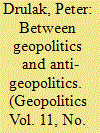

|
|
|
|
|
| Publication |
2006.
|
| Summary/Abstract |
This article examines the role of geopolitics in modern Czech political thinking. It draws on the distinction between geopolitics and anti-geopolitics to argue that the dominant tradition of Czech political thinking is anti-geopolitical. This anti-geopolitics is presented by a review of four central figures of Czech political thought since the nineteenth century (Palacký, Masaryk, Nejedlý and Havel). However, it also shows that geopolitics represents an important undercurrent in Czech political thinking which tends to dominate for brief periods of turmoil. Three such periods are addressed: the early 1920s, the late 1930s and the early 1990s.
|
|
|
|
|
|
|
|
|
|
|
|
|
|
|
|
| 8 |
ID:
115052
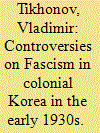

|
|
|
|
|
| Publication |
2012.
|
| Summary/Abstract |
The paper deals with the trends of fascist and fascist-like right-wing social and political thought in colonial Korea in the early 1930s. It shows that in the 1920s, Korea's right wing, its ability to reach out to the masses being severely limited, preferred mostly conciliatory tactics in its relationship with leftist radicals, often making efforts towards inventing 'hybrid' ideologies which would integrate the leftist social concerns into the mainstream religious or nationalist constructions (an example of such a hybrid were various Korean versions of Christian socialism). After the Great Depression, however, Korea's nascent bourgeoisie felt more threatened and became more interested in keeping abreast with right-wing extremist trends in the mother country (Japan) and elsewhere. Such representative ideologists of the Korean propertied class as Yun Ch'iho and Yi Kwangsu were praising Mussolini and employing strong Social Darwinist language in their exhortations to the Korean people to 'regain their vitality and develop [a] spirit of collectivism, obedience and self-sacrifice'. However, until the very end of the 1930s many of Korea's right-wing ideologues remained pronouncedly religious (Yun as Christian, Yi as Buddhist). While highlighting the religious essentials of their worldviews they often abstained from imitating the most extremist traits of European fascist ideologies (for example, anti-Semitism). In many ways, Korea's fascism continued until the end of the 1930s to be an intellectual discourse rather than a mass movement, and retained a strong aura of belonging to more mainstream religious or nationalist traditions.
|
|
|
|
|
|
|
|
|
|
|
|
|
|
|
|
| 9 |
ID:
155742
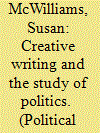

|
|
|
|
|
| Summary/Abstract |
Creative writing is not part of professional training in political science. Scholars in other fields, though, testify to the benefits of creative writing assignments, and my experiences teaching an undergraduate course on Politics and Literature suggest that there may be value in adding creative writing into certain political science courses. As with other forms of non-academic writing that political scientists identify as enriching, creative writing allows students to consider politics from multiple perspectives and expands their communicative powers. Working at the craft of storytelling—as opposed to abstract argumentation—can help students to think through key claims in contemporary political thought. Moreover, in this age of “alternative facts,” doing creative writing in a politics course may help students hone a critical skill of citizenship: thinking about the news in terms of narrative. In this essay, I consider the advantages and challenges of bringing creative writing into the study of politics.
|
|
|
|
|
|
|
|
|
|
|
|
|
|
|
|
| 10 |
ID:
001534
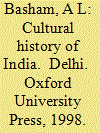

|
|
|
|
|
| Publication |
DelhI, Oxford Univ. Pr., 1998.
|
| Description |
x, 600p.: plates, mapspbk
|
| Standard Number |
0195639219
|
|
|
|
|
|
|
|
|
|
|
|
Copies: C:1/I:0,R:0,Q:0
Circulation
| Accession# | Call# | Current Location | Status | Policy | Location |
| 041095 | 954/BAS 041095 | Main | On Shelf | General | |
|
|
|
|
| 11 |
ID:
117127
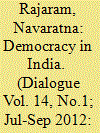

|
|
|
| 12 |
ID:
128297
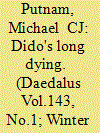

|
|
|
|
|
| Publication |
2014.
|
| Summary/Abstract |
...sic fata gradus evaserat altos, semianimemque sinu germanam amplexa fovebat cum gemitu atque atros siccabat veste cruores. illa gravis oculos conata attollere rursus de?cit; in?xum stridit sub pectore vulnus.
ter sesc attollcns cubitoquc adnixa levavit, ter revoluta toro est oculisque errantibus alto quacsivit caelo lucem ingemuitque repcrta. Tum luno omnipotens longum miserata dolorem dif?cilisque obitus lrim demisit Olympo quae luctantem animam nexosque resolvcret arms. nam quia nec fato merita nec morte peribat,
sed misera ante diem subitoque accensa furore, nondum illi flavum Proserpina vertice crinem abstulerat Stygioque caput damnaverat Orco. ergo Iris croceis per caelum roscida pennis millc trahcns varios advcrso sole colores devolat et supra caput astitit. 'hunc ego Diti sacrum iussa fero teque isto corpore solve': sic ait et dextra crinem secat. omnis et una dilapsus calor atque in ventos vita recessit.
|
|
|
|
|
|
|
|
|
|
|
|
|
|
|
|
| 13 |
ID:
153541
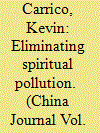

|
|
|
|
|
| Summary/Abstract |
Most histories have analyzed China’s 1983 Campaign to Eliminate Spiritual Pollution through the lens of elite politics. This article proposes a new interpretation of “spiritual pollution,” drawing upon anthropological theories of taboo and pollution to reinterpret the campaign’s role in reform-era culture and identity construction. The early reform era was a time of collapsing social borders that erased the obsessively delineated identities of the previous decades. Within this context, I reinterpret the struggle against spiritual pollution as an attempt to employ taboos to reinstate schematic boundaries in a world suddenly in flux. This process of post-Maoist boundary building particularly focused upon the distinction between “East” and “West,” as well as the distinction between the economic and political realms. The results of the campaign can still be seen today: the construction of a pure official identity based in overcoming Mao-era economic taboos alongside the perpetuation of political and cultural taboos.
|
|
|
|
|
|
|
|
|
|
|
|
|
|
|
|
| 14 |
ID:
144050
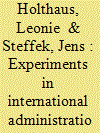

|
|
|
|
|
| Summary/Abstract |
In this article, we reintroduce the political thought of James Arthur Salter (1881–1975), a British diplomat, politician, and university professor, who made a seminal contribution to the emergence of International Relations theory in the interwar years. His academic writings were informed by his professional engagement with the Allied Maritime Transport Council (AMTC) during the First World War and the technical branches of the League of Nations. Salter promoted a distinctly transgovernmental form of expert cooperation in international advisory bodies connected to national ministries. His vision of a depoliticised transnational expertocracy inspired various IR functionalists, not least David Mitrany. Salter suggested such forms of governance also for British national politics, drawing what we call here an ‘international analogy’. His work illustrates very well how the emergence of IR theory was connected to broader trends in political theory, in particular in efforts at adapting democracy to the increasing complexities of industrial modernity.
|
|
|
|
|
|
|
|
|
|
|
|
|
|
|
|
| 15 |
ID:
134822
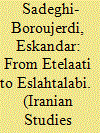

|
|
|
|
|
| Summary/Abstract |
This article examines the importance of the political thought and praxis of politico, ‘reformist’ strategist and intellectual, Saʿid Hajjarian, and his rethinking of the post-revolutionary Iranian state’s sources and bases of legitimacy in the 1990s and 2000s. It also provides an exposition and assessment of a number of his recommendations for the realisation of ‘political development’ (towseʿeh-ye siyāsi) in the post-revolutionary order and their contribution to the discourse of eslāhāt during the presidency of Hojjat al-Islam Mohammad Khatami (1997–2005). Moreover, it attempts to situate Hajjarian within a broader spectrum of reformist political opinion and its proponents within the Islamic Republic of Iran’s political class.
|
|
|
|
|
|
|
|
|
|
|
|
|
|
|
|
| 16 |
ID:
143838
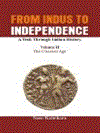

|
|
|
|
|
| Publication |
New Delhi, Vij Books India Pvt. Ltd., 2016.
|
| Description |
xx, 284p.hbk
|
| Contents |
Vol. II: Classical age
|
| Standard Number |
9789385563157
|
|
|
|
|
|
|
|
|
|
|
|
Copies: C:1/I:0,R:0,Q:0
Circulation
| Accession# | Call# | Current Location | Status | Policy | Location |
| 058481 | 954/KAI 058481 | Main | On Shelf | General | |
|
|
|
|
| 17 |
ID:
082967
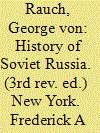

|
|
|
|
|
| Edition |
3rd rev. ed.
|
| Publication |
New York, Frederick A Praeger, 1962.
|
| Description |
xiii, 524p.
|
| Standard Number |
Hbk.
|
|
|
|
|
|
|
|
|
|
|
|
Copies: C:1/I:0,R:0,Q:0
Circulation
| Accession# | Call# | Current Location | Status | Policy | Location |
| 053680 | 947.084/RAU 053680 | Main | On Shelf | General | |
|
|
|
|
| 18 |
ID:
193665


|
|
|
|
|
| Summary/Abstract |
There is no more analyzed image in the history of political thought than the frontispiece of Hobbes’s Leviathan (1651), yet the tiny figures making up the giant have largely escaped scholarly attention. So, too, have their hats. This article recovers what men’s failure to “doff and don” their hats in the frontispiece might have conveyed to readers about their relationship to the Sovereign and each other. Sometimes big ideas—about the nature of representation, for example, or how to “acknowledge” equality—are conveyed by small gestures. When situated textually and contextually, Hobbes’s hats shed important light on the micropolitics of everyday interaction for those who, like Hobbes himself, hope to securely constitute a society of equals.
|
|
|
|
|
|
|
|
|
|
|
|
|
|
|
|
| 19 |
ID:
128299
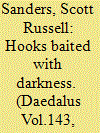

|
|
|
|
|
| Publication |
2014.
|
| Summary/Abstract |
I first read Walden when l was seventeen. the summer before starting college. at the urging of a high school teacher who sensed that my adolescent mind. brimming with questions, would bene?t from grappling with a truly radical thinker. Much of the book baf?ed me. The tone shifted unpredictably from conversational to prophetic, from jokey to stem, from earthy to mystical. I was bewildered by some of the lengthy sentences, which zigvagged among ideas and images. and l was stumped by the cryptic short ones. which seemed to compress whole paragraphs of meaning into a few words. Not yet having made any big decisions about how to lead my life, I couldn't ?gure out what was troubling this Henry David Thoreau. So what if his neighbors
thought he should use his Harvard degree to land a job and a wife, and then proceed to have kids, buy a
house. get rich. and distribute aims to the poor? Couldn't he just ignore the scolds and go his own way? Not yet having lost a loved one to accident. illness. or old age, I only dimly understood his brood- ing about that amoral process we call nature. So what if armies of red ants and black ants slaugh- tered one another, herons gobbled tadpoles, a dead horse stank up the woods, or a thousand seeds per- ished for each one that took root? What did all that mayhem and waste have to do with us, the owners of souls aiming at heaven ?
|
|
|
|
|
|
|
|
|
|
|
|
|
|
|
|
| 20 |
ID:
131421
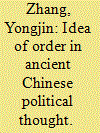

|
|
|
|
|
| Publication |
2014.
|
| Summary/Abstract |
Is there any significant International Thought in antiquity beyond the West? If there is, why has there as yet been no meaningful conversation between the expanding enterprise of theorizing International Relations (IR) today and ancient Chinese political thought? This extended version of my Martin Wight Memorial Lecture addresses these questions through a critical exploration of how a pivotal idea in ancient as well as contemporary international relations, namely, the idea of order, is deliberated in ancient Chinese political thought. Inspired by Martin Wight's profound scholarship so steeped in historical and philosophical depth, it investigates why and how alternative visions of moral, social and political order are imagined, offered and debated in ancient Chinese philosophical discourse. It examines the ways in which the moral and political pursuit of order as a social ideal is conducted in the anarchical society of states in ancient China. Through these historical and philosophical investigations, this article seeks to establish that ancient Chinese political and philosophical deliberations are rich in international thought and that classical thinkers in China's Axial Age are alive to us and contemporaneous with us philosophically as much as ancient Greek philosophers are. In establishing such a claim, the article calls for, and issues an invitation to, a conversation between the world of thought in ancient China and the theorization of IR as an intellectual ritual in search of a truly international theory.
|
|
|
|
|
|
|
|
|
|
|
|
|
|
|
|
|
|
|
|
|